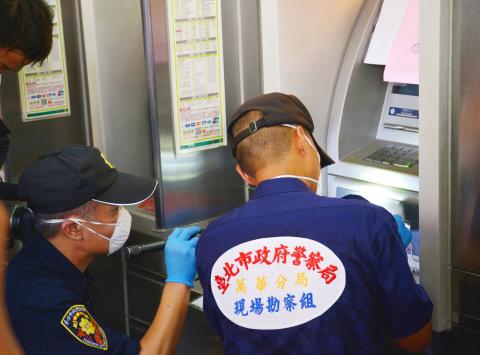State-run First Commercial Bank (第一銀行) yesterday denied allegations that its employees were involved in last week’s automatic teller machine (ATM) hacking incident, which led to the theft of more than NT$83 million (US$2.5 million).
“An internal probe by the company did not reveal evidence suggesting that the theft was an inside job,” First Commercial Bank president Chou Po-chaio (周伯蕉) said at a news conference following a question-and-answer session with the legislature’s Finance Committee.
The allegations that rogue employees were involved in the hack arose because First Commercial Bank was the only institution targeted among the many banks that use the same Wincor Nixdorf ATM model.

Photo: CNA
Chou said the company respects prosecutors’ efforts in investigating the case and that it has been cooperating with authorities.
Based on the bank’s latest tallies, suspects involved in the ATM heist had tampered with 41 machines and made off with NT$83.27 million in cash, higher than the NT$70 million it had estimated earlier.
Chou said it took the bank some time to tally losses at ATMs not installed at the bank’s branches, as the process must be conducted with the company’s security and surveillance service provider.
The bank did not attempt to downplay the severity of the heist, he said.
Taipei police on Thursday said they were looking at the possibility that an international organized crime ring was involved in the ATM hacking.
The police said they were tracking down six suspects, most of whom were from Eastern Europe.
There are no Taiwanese on the list of suspects, they said.
The modus operandi was similar to another heist carried out several years ago in Europe by an international organized crime ring, the police said, adding that there is a possibility of a link between the two cases.
The police said two of the suspects — identified only as Russian nationals Berezovskiy, 34, and Berkman, 28 — have already left Taiwan, while a third suspect, whose nationality is not yet known, has also left the nation.
Since no large amounts of cash were found in the luggage of the two Russians at Taiwan’s customs, police believe that the stolen money is in the hands of a Latvian suspect identified as Andrenjes and others who are likely still in Taiwan.
First Commercial Bank said that an internal probe found that the heist was committed without “inserting cards” or “handling the ATMs in any incorrect or illegal way,” but the machines were simply “spitting out” a steady stream of bills.
Chou said suspects had implanted a self-deleting software virus into the ATMs, which has made subsequent forensic investigations more difficult.
However, investigators might be able to find clues from two of the ATMs, as a passerby had alerted bank security of suspicious activity, forcing the suspects to flee before they finished collecting the cash, Chou said.
Chou apologized to the public and reiterated that an internal audit showed that the heist did not affect customers’ deposits and accounts, and that the company would take full responsibility if discrepancies are found.
Additional reporting by CNA

The US dollar was trading at NT$29.7 at 10am today on the Taipei Foreign Exchange, as the New Taiwan dollar gained NT$1.364 from the previous close last week. The NT dollar continued to rise today, after surging 3.07 percent on Friday. After opening at NT$30.91, the NT dollar gained more than NT$1 in just 15 minutes, briefly passing the NT$30 mark. Before the US Department of the Treasury's semi-annual currency report came out, expectations that the NT dollar would keep rising were already building. The NT dollar on Friday closed at NT$31.064, up by NT$0.953 — a 3.07 percent single-day gain. Today,

‘SHORT TERM’: The local currency would likely remain strong in the near term, driven by anticipated US trade pressure, capital inflows and expectations of a US Fed rate cut The US dollar is expected to fall below NT$30 in the near term, as traders anticipate increased pressure from Washington for Taiwan to allow the New Taiwan dollar to appreciate, Cathay United Bank (國泰世華銀行) chief economist Lin Chi-chao (林啟超) said. Following a sharp drop in the greenback against the NT dollar on Friday, Lin told the Central News Agency that the local currency is likely to remain strong in the short term, driven in part by market psychology surrounding anticipated US policy pressure. On Friday, the US dollar fell NT$0.953, or 3.07 percent, closing at NT$31.064 — its lowest level since Jan.

The New Taiwan dollar and Taiwanese stocks surged on signs that trade tensions between the world’s top two economies might start easing and as US tech earnings boosted the outlook of the nation’s semiconductor exports. The NT dollar strengthened as much as 3.8 percent versus the US dollar to 30.815, the biggest intraday gain since January 2011, closing at NT$31.064. The benchmark TAIEX jumped 2.73 percent to outperform the region’s equity gauges. Outlook for global trade improved after China said it is assessing possible trade talks with the US, providing a boost for the nation’s currency and shares. As the NT dollar

The Financial Supervisory Commission (FSC) yesterday met with some of the nation’s largest insurance companies as a skyrocketing New Taiwan dollar piles pressure on their hundreds of billions of dollars in US bond investments. The commission has asked some life insurance firms, among the biggest Asian holders of US debt, to discuss how the rapidly strengthening NT dollar has impacted their operations, people familiar with the matter said. The meeting took place as the NT dollar jumped as much as 5 percent yesterday, its biggest intraday gain in more than three decades. The local currency surged as exporters rushed to